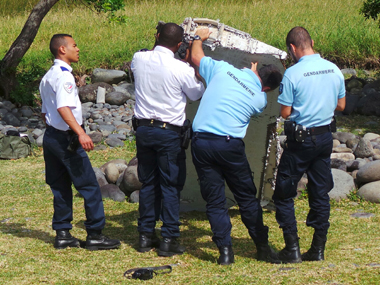Kuala Lumpur, Oct 7: A piece of an aircraft wing found on the Indian Ocean island of Mauritius has been identified as belonging to missing Malaysia Airlines Flight 370, Malaysian and Australian officials said today.
 The piece of wing flap was found in May and subsequently analysed by experts at the Australian Transport Safety Bureau, which is heading up the search for the plane in a remote stretch of ocean off Australia's west coast.
The piece of wing flap was found in May and subsequently analysed by experts at the Australian Transport Safety Bureau, which is heading up the search for the plane in a remote stretch of ocean off Australia's west coast.
Investigators used a part number found on the debris to link it to the missing Boeing 777, the agency said in a statement. Malaysian Transport Minister Liow Tiong Lai also confirmed the identification.
Several pieces of wreckage from the plane have washed ashore on coastlines around the Indian Ocean since the aircraft vanished with 239 people on board during a flight from Kuala Lumpur, Malaysia, to Beijing on March 8, 2014.
So far, none of the debris has helped narrow down the precise location of the main underwater wreckage. Investigators need to find that in order to locate the flight data recorders that could help explain why the plane veered so far off-course.
Search crews are expected to finish their sweep of the 120,000 square kilometre (46,000 square mile) search zone in the Indian Ocean by December.
Oceanographers have been analysing wing flaps found in Tanzania and on the French island of La Reunion to see if they might be able to identify a potential new search area through drift modeling.
But any new search would require more funding; Malaysia, Australia and China said in July that the USD 160 million hunt will be suspended once the current stretch of ocean is exhausted unless new evidence emerges that would pinpoint a specific location of the aircraft.





Comments
Add new comment